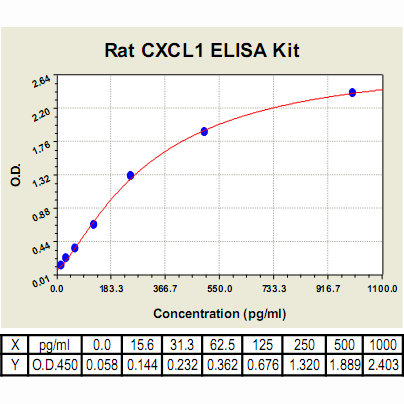Product Sheet CL0724
Description
BACKGROUND The CXC chemokines containing an ELR (glutamate, leucine, and arginine) motif include CXCL1, 2, 3, 5, 6, 7, and 8. These chemotactic cytokines act through CXCR1 and/or CXCR2 receptors.1 CXCL1 (also called growth-regulated oncogene 1,GRO1) is found as an inflammatory factor and necessary for wound healing by modulating cell migration and angiogenesis. The mouse CXCL1 homologues are keratinocytes and macrophage-inflammatory protein-2 (MIP-2). CXCL1 is a 73-amino acid secreted protein, contains a ELR motif between the N terminus and the first cysteine. CXCL1 is structurally and functionally related to CXCL2 (GRO2), CXCL3(GRO3), and interleukin-8. These four ligands constitute the CXC chemokine subfamily. All four ligands bind to the seven-transmembrane G-protein-coupled receptor CXCR2, with CXCL1 having the highest affinity. Upon ligand-receptor interaction, various signaling cascades are activated, including ERK1/2, JAK2-STAT3, phosphatidylinositol 3-kinase, and tyrosine kinases, to promote cell proliferation, angiogenesis, and cell invasion and migration.2
CXCL1 is also found to be an oncogene and has pleiotropic effects on cell proliferation, tumor angiogenesis, invasion, and metastasis. It is frequently overexpressed in many cancers, such as squamous cell carcinoma, melanoma, breast cancer, ovarian cancer, colorectal cancer, and prostate cancer. Consistent with this, ectopic expression of CXCL1 promotes low CXCL1-producing cells to proliferate and spontaneous metastasis in BALB/c mice. Conversely, abolition of CXCL1 via anti- CXCL1-neutralizing antibody leads to reduction of tumor growth with decreased microvessel formation. Furthermore, CXCL1 was found to be a potent mediator of tumor-associated angiogenesis in colorectal and breast cancers.3 Transcriptional analysis revealed that the CXCL1 promoter contains several cis-acting elements, including the ones recognized by nuclear factor κB (NF-κB), Sp1, and human CUT homeodomain protein/CCAAT displacement protein. Indeed, NF-κB activity is found to be necessary for CXCL1 expression in microvascular endothelial cells and breast cancer cells. Thus, CXCL1 is regarded as one of NF-κB target genes. Futhermore, it was demonstrated that CXCL1 is transactivated by endogenous mutant p53 and serves as a crucial determinant for mutant p53 gain of function.4
CXCL1 is also found to be an oncogene and has pleiotropic effects on cell proliferation, tumor angiogenesis, invasion, and metastasis. It is frequently overexpressed in many cancers, such as squamous cell carcinoma, melanoma, breast cancer, ovarian cancer, colorectal cancer, and prostate cancer. Consistent with this, ectopic expression of CXCL1 promotes low CXCL1-producing cells to proliferate and spontaneous metastasis in BALB/c mice. Conversely, abolition of CXCL1 via anti- CXCL1-neutralizing antibody leads to reduction of tumor growth with decreased microvessel formation. Furthermore, CXCL1 was found to be a potent mediator of tumor-associated angiogenesis in colorectal and breast cancers.3 Transcriptional analysis revealed that the CXCL1 promoter contains several cis-acting elements, including the ones recognized by nuclear factor κB (NF-κB), Sp1, and human CUT homeodomain protein/CCAAT displacement protein. Indeed, NF-κB activity is found to be necessary for CXCL1 expression in microvascular endothelial cells and breast cancer cells. Thus, CXCL1 is regarded as one of NF-κB target genes. Futhermore, it was demonstrated that CXCL1 is transactivated by endogenous mutant p53 and serves as a crucial determinant for mutant p53 gain of function.4
REFERENCES
1. Dhawan, P. & Richmond, A.:J. Leuk. Biol. 72:9-18, 2002
2. Loukinova, E. et al: Oncogene 19:3477-86, 2000
3. Loukinova, E. et al: Int. J. Cancer 94:637-44, 2001
4. Yan, W. & Chen, X.: J. Biol. Chem. 284:12178-87, 2009)
2. Loukinova, E. et al: Oncogene 19:3477-86, 2000
3. Loukinova, E. et al: Int. J. Cancer 94:637-44, 2001
4. Yan, W. & Chen, X.: J. Biol. Chem. 284:12178-87, 2009)
Products are for research use only. They are not intended for human, animal, or diagnostic applications.
Details
Cat.No.: | CL0724 |
Target Protein Species: | Rat |
Range: | 15.6 pg/ml – 1000pg/ml |
Specificity: | No detectable cross-reactivity with other cytokines |
Storage: | Store at 4°C. Use within 6 months. |
ELISA Kits are based on standard sandwich enzyme-linked immunosorbent assay technology. Freshly prepared standards, samples, and solutions are recommended for best results.
Products
| Product | Size | CAT.# | Price | Quantity |
|---|---|---|---|---|
| Rat CXCL1/GRO ELISA Kit: Rat Chemokine (C-X-C Motif) Ligand 1 ELISA Kit | Size: 96 wells | CAT.#: CL0724 | Price: $533.00 |

